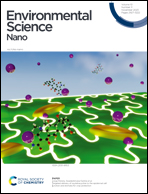Improved methodology for the analysis of polydisperse engineered and natural colloids by single particle inductively coupled plasma mass spectrometry (spICP-MS)†
Abstract
Although nanomaterials (NMs), both natural (clays, mineral dust aerosols, etc.) and anthropogenic (nanoplastics, tire wear particles, etc.) have been recognized as a key component of environmental processes, their characterization and quantification in environmental matrices remains difficult. In contrast to monodisperse NM standards, environmentally-sampled NMs can contain a broad, continuous, polydisperse particle size distribution which creates analytical difficulties for many single particle counting techniques, including single particle inductively coupled plasma mass spectrometry (spICP-MS). By employing environmentally relevant, nanoplastics tagged with metals, as well as Al-bearing stream mineral colloids, we demonstrate the deleterious effects of particle-based backgrounds caused by coincident small particles on spICP-MS analysis of particle number concentration (PNC) and particle size distribution (PSD). A novel methodology is presented that successfully minimizes the effects of particle coincidence using serial dilutions to identify distortion-free segments of the PSD, which are combined and modeled using a power law distribution. The physical relevance of the parameters derived from power law modeling are demonstrated using suspensions of two different nanoplastics tagged with metals. Finally, this new methodology is applied to analysis of Al-bearing colloids sampled during a storm event in order to highlight the possible distortions present in a single dilution analysis. This comparison demonstrates the value of our proposed methodology for environmental NM and colloid analysis.



 Please wait while we load your content...
Please wait while we load your content...